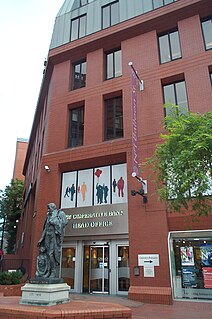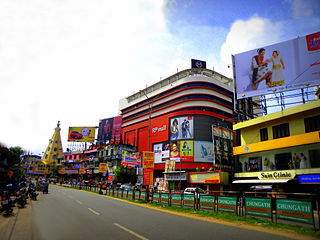Capex or capital expenditure is an expenditure where the benefit continues over a long term.
Capex or CAPEX may also refer to:
English usually refers to:
Strike may refer to:
NH or Nh may refer to
In corporate finance, free cash flow (FCF) or free cash flow to firm (FCFF) is the amount by which a business's operating cash flow exceeds its working capital needs and expenditures on fixed assets. It is that portion of cash flow that can be extracted from a company and distributed to creditors and securities holders without causing issues in its operations. As such, it is an indicator of a company's financial flexibility and is of interest to holders of the company's equity, debt, preferred stock and convertible securities, as well as potential lenders and investors.

An operating expense, operating expenditure, operational expense, operational expenditure or opex is an ongoing cost for running a product, business, or system. Its counterpart, a capital expenditure (capex), is the cost of developing or providing non-consumable parts for the product or system. For example, the purchase of a photocopier involves capex, and the annual paper, toner, power and maintenance costs represents opex. For larger systems like businesses, opex may also include the cost of workers and facility expenses such as rent and utilities.

Capital expenditure or capital expense is the money an organization or corporate entity spends to buy, maintain, or improve its fixed assets, such as buildings, vehicles, equipment, or land. It is considered a capital expenditure when the asset is newly purchased or when money is used towards extending the useful life of an existing asset, such as repairing the roof.
Above the line may refer to:
Kollam district, is one of 14 districts of the state of Kerala, India. The district has a cross-section of Kerala's natural attributes; it is endowed with a long coastline, a major Laccadive Sea seaport and an inland lake. The district has many water bodies. Kallada River is one among them, and the east side land of river is East Kallada and the west side land is West Kallada.
Wilco is an American rock band.
The debt service coverage ratio (DSCR), known as "debt coverage ratio" (DCR), is the ratio of operating income available to debt servicing for interest, principal and lease payments. It is a popular benchmark used in the measurement of an entity's ability to produce enough cash to cover its debt payments. The higher this ratio is, the easier it is to obtain a loan. The phrase is also used in commercial banking and may be expressed as a minimum ratio that is acceptable to a lender; it may be a loan condition. Breaching a DSCR covenant can, in some circumstances, be an act of default.

Cooperative banking is retail and commercial banking organized on a cooperative basis. Cooperative banking institutions take deposits and lend money in most parts of the world.
The building block model is a form of public utility regulation that is common in Australia. Variants of the building block model are currently used in Australia in the regulation of electricity transmission and distribution, gas transmission and distribution, railways, postal services, urban water and sewerage services, irrigation infrastructure, and port access. The Australian Competition and Consumer Commission has stated that it intends to use a version of the building block model to determine indicative access prices for fixed-line telecommunications services. The building block model is so-called because the allowed revenue of the regulated firm is equal to the sum of underlying components or building blocks consisting of the return on capital, the return of capital, the operating expenditure, and various other components such as taxes and incentive mechanisms.
The "world's largest cashew tree" may refer to one of two trees in Brazil:
An apple is an edible fruit.
SM CITY CAUAYAN is a shopping mall owned by SM Prime Holdings. The mall is located along National Highway, District II, Cauayan, Isabela, Philippines. It was the first SM Supermall in Region 2 of the Philippines, better known as Cagayan Valley. It was designed by DSGN Associates, EAurelio Landscape Design Inc. and JRP Design Inc.

Kollam or Quilon is an old seaport and a city on the Laccadive Sea coast in Kerala, India, on Ashtamudi Lake. The city remains notable as the ancient commercial capital of Kerala and the southwestern Indian coast, in addition to its fame as the "Cashew Capital of the World". The Kollam Municipal Corporation has the second largest budget in Kerala in terms of revenue and expenditure.
In corporate finance, free cash flow to equity (FCFE) is a metric of how much cash can be distributed to the equity shareholders of the company as dividends or stock buybacks—after all expenses, reinvestments, and debt repayments are taken care of. It is also referred to as the levered free cash flow or the flow to equity (FTE). Whereas dividends are the cash flows actually paid to shareholders, the FCFE is the cash flow simply available to shareholders. The FCFE is usually calculated as a part of DCF or LBO modelling and valuation.
Cooperative game may refer to:
S. Krishna Kumar is a bureaucrat turned Indian politician from Kerala. He was also a technologist, technocrat, trade unionist, political and social worker, sportsman, Engineer and Civil Servant. He was a former leader of Indian National Congress in Kerala and joined Bharatiya Janata Party on 20 April 2019. He has been elected to the Lok Sabha three times during 80s and 90s, and was also a minister in the Rajiv Gandhi ministry and Rao ministry. He served as a member of the Lok Sabha representing Quilon. He was elected to 8th, 9th and 10th Lok Sabha.
The 2022 Union Budget of India was presented by the Minister of Finance Nirmala Sitharaman on the 1st of February 2022, as her fourth budget. This is the third budget of Narendra Modi-led NDA government's second term. The Economic Survey for 2021–2022 was released on 31 January 2022, a day before the budget.